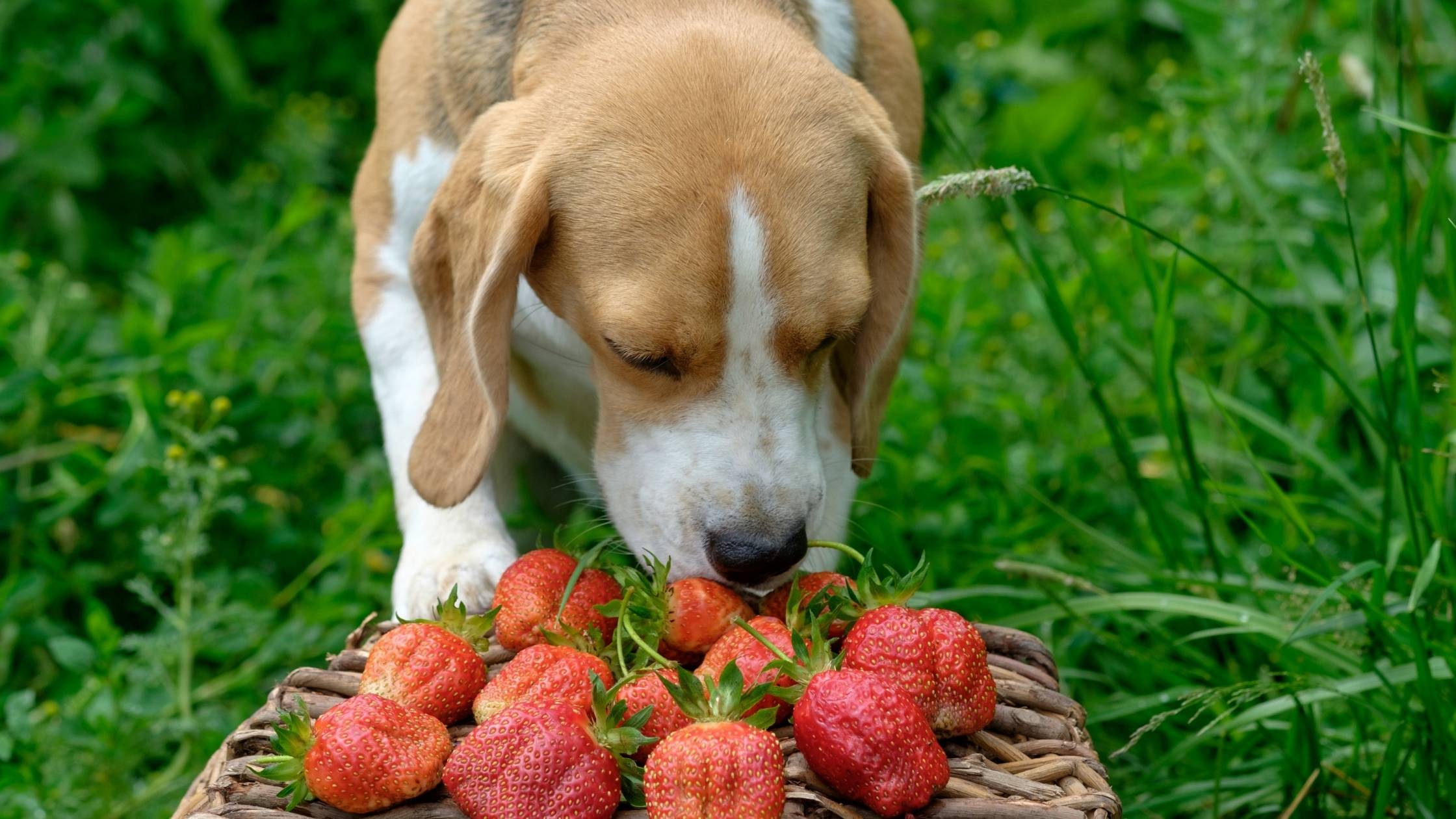Last Updated on 05/28/2021 by Veronica Jones
Fruits and vegetables: love them or hate them, there’s no denying the many health benefits of eating your five a day.
But do the same health benefits apply to dogs? Should you give your dogs fruit and vegetables in addition to their normal dog food?
Some fruits and vegetables can actually help to strengthen a dog’s immune system, reduce inflammation and aid digestion. But it’s important that you choose the right ones.
Look no further than our complete list of what fruits and vegetables that dogs can and can’t eat.
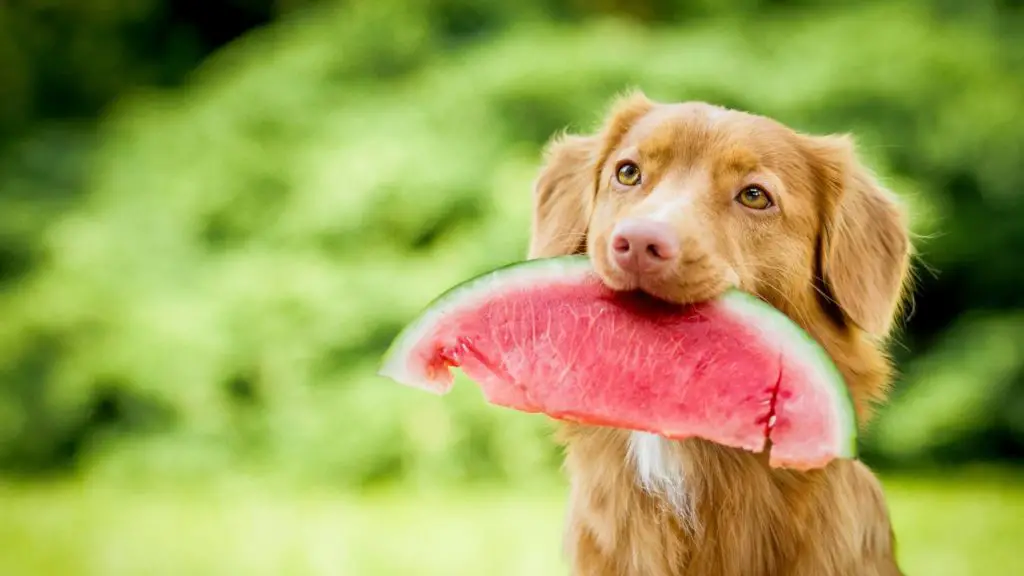
What fruits can dogs eat?
1. Apple
Dogs can eat apples. The flesh of an apple is a safe, tasty and nutritious snack for your dog. It can even help to keep your canine’s teeth clean and freshen their breath. However, it’s important to remove the core and any apple seeds as they could be harmful.
How much to give your pooch: a slice or two daily as part of a balanced diet.
Can puppies eat apples? Yes, as long as you supervise them and remove the seeds.
2. Banana
Each part of a banana is safe for your furry friend. They also contain nutrients such as potassium.
How much to give your pooch: Bananas are high in sugar so should be given as an occasional treat.
Can puppies eat bananas? Yes, puppies can enjoy bananas too but check with your veterinarian first to make sure it doesn’t interfere with their special growth diet.
3. Blueberries
Blueberries are packed with antioxidants, fiber and vitamins C and K which all support the immune system.
How much to give your pooch: blueberries are low in calories, so don’t feel bad about giving them to your dog as a snack.
Can puppies eat blueberries? Yes. The same health benefits apply to puppies.
4. Blackberries
Blackberries are loaded with antioxidants that help to fight free radicals in your dog.
How much to give your pooch: blackberries are low in sugar and calories, making them a good option for an occasional snack or treat.
Can puppies eat blackberries? Absolutely, if given as part of a balanced puppy diet.
5. Celery
It’s safe to give your dog raw or cooked celery. Celery contains vitamins A, C and K, potassium and folate. This vegetable is also fat free and low in calories, making it a good choice of snack for overweight pooches.
How much to give your pooch: too much celery can cause your dog to urinate more than usual as it causes the body to expel water. Large amounts of celery can also lead to gas and gastrointestinal upset so give it in moderation.
Can puppies eat celery? Yes. Celery is considered safe for puppies to consume in moderation.
6. Cranberries
Dogs can reap the health benefits of cranberries too. These tiny fruits contain high levels of Vitamin C, fiber, potassium, and can even fight inflammation.
How much to give your pooch: too much of a good thing can cause problems, and cranberries are no exception. Overfeeding your dog cranberries can cause calcium oxalate stones in their bladder. Only give cranberries as an occasional, healthy treat.
Can puppies eat cranberries? Yes, if given in moderation.
7. Coconut
Coconut flesh and oil are safe for dogs and contain anti-inflammatories that can help with conditions such as skin allergies, arthritis and inflammatory bowel disease.
Never feed your dog the shell as it can cause an intestinal obstruction.
How much to give your pooch: the amount you give your dog will depend on its size, breed and medical history so check with your veterinarian first.
Can puppies eat coconut? Yes, but check with your vet beforehand.
8. Mango
Dogs can safely enjoy mango as a sweet treat. Mango contains Vitamins A, B6, C and E. Peel the mango and remove the pit before serving to your pooch. Make sure the soft flesh is cut into small pieces to avoid a choking hazard.
How much to give your pooch: mangos contain high levels of sugar so only give in moderation.
Can puppies eat mango? While puppies can have mango as a snack, consult your vet first to make sure it’s suitable for their diet.
9. Nectarines
Nectarines are a sweet and nutritious summer fruit that dogs can enjoy in moderation. Vitamins A and C, potassium, fiber and magnesium make them a nutritional fruit.
How much to give your pooch: one or two slices on occasions is plenty. Too much can upset your dog’s stomach.
Can puppies eat nectarines? It’s best to avoid giving your puppy nectarines as they contain high levels of sugar.
10. Watermelon
Watermelon is packed full of nutrients, moisture and fiber, making it a healthy and hydrating snack for your dog.
How much to give your pooch: watermelon should be an occasional treat as part of a balanced diet to avoid obesity and diabetes.
Can puppies eat watermelon? Yes, as long as they avoid the rind because that can cause gastrointestinal upset.
11. Pear
Removing the pit and seeds and cutting the flesh up into bite-sized pieces will make pear a safe fruit for canines. Pear contains copper, fiber and vitamins C and K.
How much to give your pooch: a slice of pear now and then is plenty.
Can puppies eat pear? Yes, if cut up small enough for your dog to chew and digest.
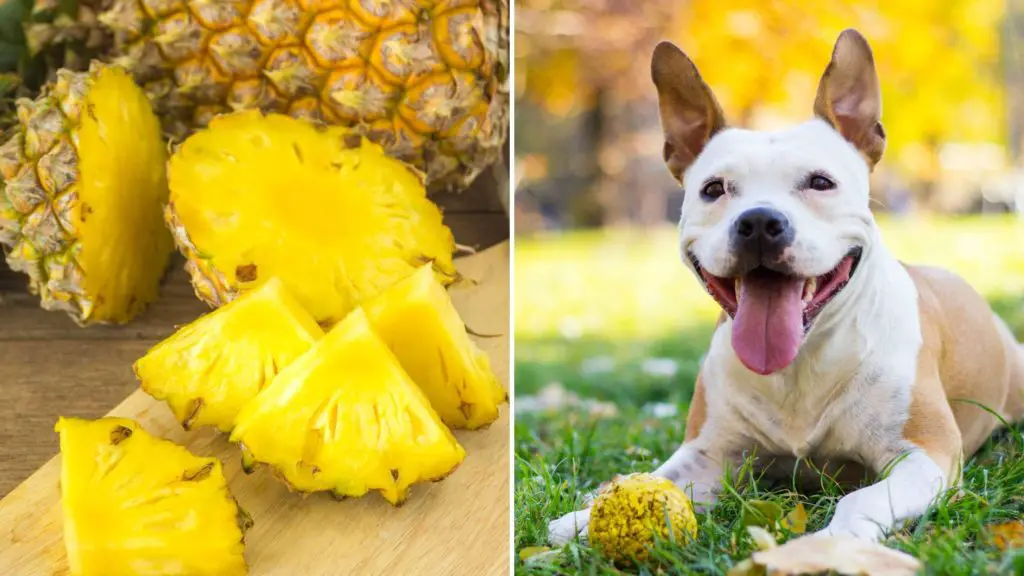
12. Pineapple
As long as you remove the prickly peel and crown, dogs can enjoy pineapple and benefit from the vitamins, minerals and fiber it contains.
How much to give your pooch: a few small chunks of pineapple a few times a week is enough.
Can puppies eat pineapple? If the flesh is cut up into small pieces, puppies can enjoy the occasional bit of pineapple too.
13. Pumpkin
Dogs can eat both the pulp and seeds from pumpkins. The high levels of fiber make it an effective remedy for diarrhea or constipation in pooches.
How much to give your pooch: start by feeding your dog one or two tablespoons of pumpkin every other day, depending on your dog’s size.
Can puppies eat pumpkin? Puppies can eat pumpkin as part of a balanced diet. Offer pureed pumpkin while they are being weaned.
14. Raspberries
Raspberries make a tasty treat for your dog that’s full of antioxidants, manganese, fiber and vitamin C.
How much to give your pooch: raspberries contain low levels of natural xylitol, which can be toxic to dogs. This means that it’s safe to give your pooch raspberries, but only in moderation.
Can puppies eat raspberries? Yes, in small amounts.
15. Strawberries
Aside from the obvious health benefits of strawberries (high levels of antioxidants, fiber and Vitamin C), strawberries can even whiten your pup’s teeth.
How much to give your pooch: strawberries contain sugar, so only feed them to your dog as an occasional treat.
Can puppies eat strawberries? Yes, as long as they don’t overindulge as the sugar levels can cause long-term health issues in canines.
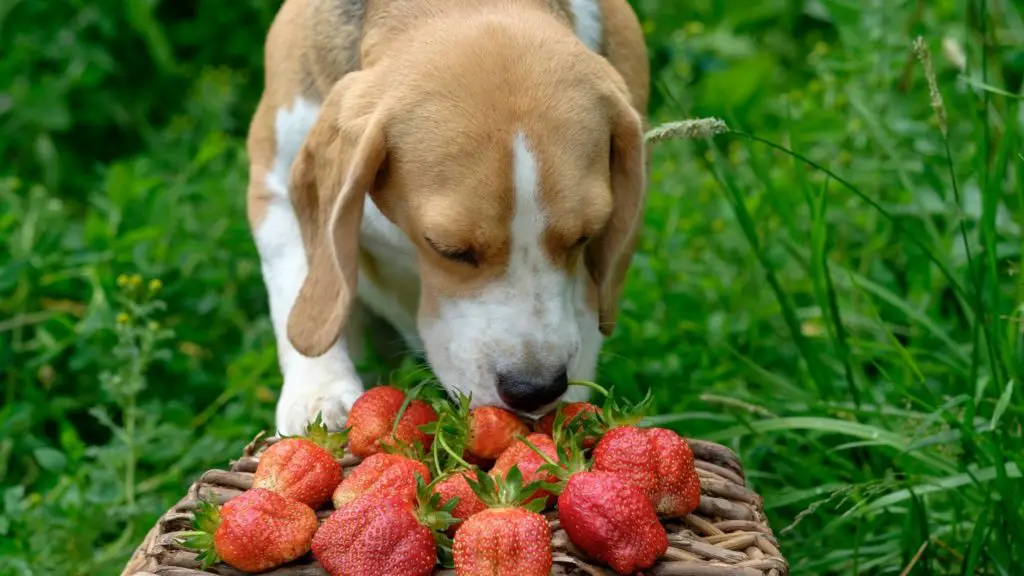
16. Oranges
The fleshy part of an orange contains vitamin C and is safe for dogs. However, the skin, pith and seeds may contain toxins.
How much to give your pooch: oranges contain a lot of natural sugar so should only be given to dogs occasionally to avoid weight gain.
Can puppies eat oranges? Yes, but only small amounts of the flesh as too much can cause gastrointestinal upset.
What fruits can dogs not eat?
17. Apricot
While the flesh of an apricot is considered safe for dogs, the stone, leaves and stem contain cyanide which is highly poisonous to canines and should be avoided.
18. Avocado
Avocados contain persin, which is a fungicidal toxin that can cause serious health problems, and even death in dogs.
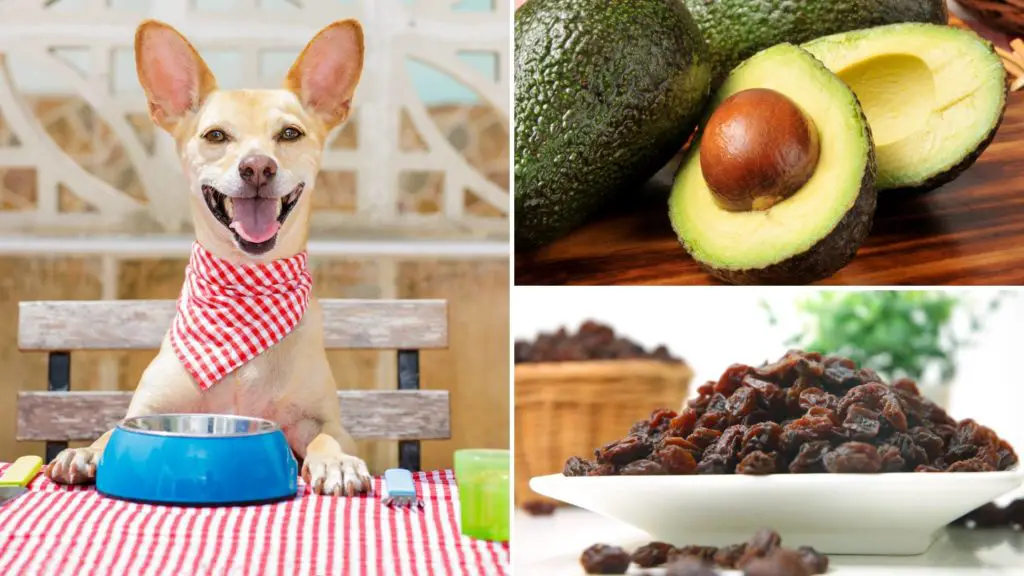
19. Cherries
Cherries should not be given to canines as the pits are a choking hazard.
20. Grapefruit
The rind of grapefruit is toxic to dogs and the flesh is very acidic, which can cause digestive issues.
21. Lemons
Lemons contain no health benefits for dogs. They can also cause digestive problems and contain high levels of citric acid, which could make your furry friend ill.
22. Lime
Just like lemons, limes contain dangerous levels of citric acid and should not be given to dogs.
23. Grapes
Dogs cannot eat grapes. Even though grapes are small, just one or two could cause serious harm to your pooch.
24. Raisins and currants
Dried fruit is very toxic to dogs and can even lead to kidney failure.
25. Rhubarb
Toxins found in rhubarb can cause damage to your dog’s nervous system, kidneys and digestive system.
26. Plums
The pits of a plum could cause a bowel blockage if consumed by your dog.
27. Wild berries
Not all berries are good for dogs. Avoid letting your pooch eat wild berries as there is a risk that they could be poisonous.
28. Figs
The high fiber content can cause severe diarrhea in dogs.
What vegetables can dogs eat?
29. Brussel sprouts
Brussel sprouts are rich in antioxidants and fiber which can help to improve blood circulation and help reduce inflammation. They are also packed full of essential vitamins.
How much to give to your pooch: too many sprouts can cause gastrointestinal issues like diarrhea and gas, so only give to your dog in moderation.
Can puppies eat Brussel sprouts? Yes, but in moderation and consult your vet beforehand.
30. Cabbage
Cabbage is a safe source of vitamins K, C, B6 and B1 for dogs and can be enjoyed on its own or baked and stuffed with other pet-friendly ingredients.
How much to give your pooch: cabbage is low in calories so can be enjoyed as a regular snack or meal addition.
Can puppies eat cabbage? Yes, if it’s cut up into small, bite-sized pieces.
31. Carrots
The carrot itself and the leafy green top are safe for dogs to munch on. Carrots can even slow down the progression of dental disease.
How much to give your pooch: carrots are extremely healthy for dogs, so they can be enjoyed daily as part of a balanced diet.
Can puppies eat carrots? Yes, as long as you cut them into manageable pieces to avoid a choking hazard. Steamed or boiled carrots are easier for puppies to eat.
32. Cauliflower
Cauliflower is another safe, nutritious vegetable that you can feed to your pooch. It contains fiber, folate, potassium, calcium and vitamins K and C.
How much to give your pooch: feed your dog small amounts of cauliflower occasionally.
Can puppies eat cauliflower? It’s safe to feed puppies small amounts of cooked cauliflower in moderation.
33. Peas
Dogs can snack on green peas, sugar snap peas and garden peas on occasion. Peas contain vitamins and minerals to help support a healthy immune system in canines.
How much to give your pooch: small breeds should stick to a teaspoon of peas now and then, and larger breeds should be given a tablespoon on occasions.
Can puppies eat peas? Yes, in small amounts. Never give your pup canned peas as they have added sodium which can be harmful.
34. Peppers
Dogs can safely eat any color of raw or cooked peppers, as long as the stem and seeds are removed first. Peppers contain vitamins A and C which help heal scarring and create new skin tissues.
How much to give your pooch: this will depend on your dog’s size and diet, so consult your vet first. Make sure your dog gets a variety of vitamins and nutrients in its diet.
Can puppies eat peppers? Yes, if cooked and cut up into manageable pieces to avoid a choking hazard.
35. Sweet potato
Sweet potatoes are a good source of fiber for dogs. Cook the potato well and remove the skin before serving to your canine so it’s easier to digest.
How much to give your pooch: too much sweet potato can cause health issues so give in moderation.
Can puppies eat sweet potatoes? Yes, as long as it’s served cooked and without the skin.
36. Cucumber
Cucumber is another safe, low-calorie snack for dogs.
How much to give your pooch: too much cucumber can cause your dog to have an upset tummy, so only feed it to your dog in small amounts.
Can puppies eat cucumber? As long as the puppy is weaned and ready for solid food, cucumber can be given in small portions as an occasional treat.
37. Green beans
Green beans contain high levels of iron and vitamins, making them a healthy snack for canines.
How much to give your pooch: only feed your furry friend fresh green beans, not the tinned kind that contains added salt.
Can puppies eat green beans? Unseasoned green beans can be a good addition to your pup’s diet, however consult your veterinarian first.
38. Lettuce
Romaine, arugula and iceberg lettuce do not contain anything that will harm your dog.
How much to give your pooch: small pieces are perfectly fine, and are a good choice for a low-calorie treat for overweight dogs.
Can puppies eat lettuce? Yes, as part of a balanced puppy diet.
39. Kale
Kale is high in fiber and low in calories, making it a good treat for dogs who need to lose weight.
How much to give your pooch: as with all vegetables, only give kale occasionally.
Can puppies eat kale? Check with your veterinarian before feeding kale to your puppy.
40. Squash
Cooked butternut squash is perfectly safe to give your dog, but it should be served without any seasoning or oils.
How much to give your pooch: regular small amounts of squash is recommended for dogs.
Can puppies eat squash? Yes, as long as it’s cooked and the skin and seeds are removed.
41. Courgettes
Courgette is a good source of vitamin C, potassium, calcium and folate that helps to support the functioning of your dog’s muscles, nerves, immune system and vision.
How much to give your pooch: too much courgette can cause excessive gas in dogs, so only give in small amounts.
Can puppies eat courgette? Puppies can safely enjoy courgette too as an occasional small treat.
42. Eggplant
Eggplant is a non-toxic food for most dogs, however dogs who have kidney problems or arthritis should avoid it.
How much to give your pooch: small amounts that don’t contain any seasoning are safe for canines.
Can puppies eat eggplant? Small amounts of cooked eggplant can be given to a puppy, however you should consult your veterinarian first.
What vegetables can dogs not eat?
43. Asparagus
Asparagus itself is not toxic to dogs, however the inedible part of the asparagus plant (known as the asparagus fern) is, so it’s best to keep your four-legged friend away from it. Raw asparagus is also difficult for dogs to digest.
44. Broccoli
Broccoli contains an ingredient called isothiocyanate which can cause gastric irritation and severe abdominal pain in dogs.
45. Onions
Onions contain N-propyl disulfide which is toxic to dogs. You shouldn’t give any part of the onion part to your pooch, including the flesh, leaves, juice or processed powders.
46. Mushroom
Your four-legged friend may see mushrooms as an interesting snack while out for a walk, but you should avoid feeding your dog mushrooms because some can be extremely dangerous when eaten.
47. Potato
Never feed your dog raw potatoes as they contain solanine, which is toxic to dogs. Cooking a potato will reduce the level of solanine, however it could still be harmful to your canine.
48. Spinach
While spinach contains vitamins, iron and antioxidants, it contains high levels of oxalic acid which stops a dog’s body from absorbing calcium and even lead to kidney disease.
49. Unripe tomatoes and tomato plants
It’s important to make sure your pooch can’t access your tomato plants because they contain tomatine, which can damage the nervous system, kidneys and digestive tract.
50. Watercress
If eaten, watercress can cause dogs to vomit or a case of diarrhea. It can even be toxic to some canines so avoid feeding it to your furry friend.
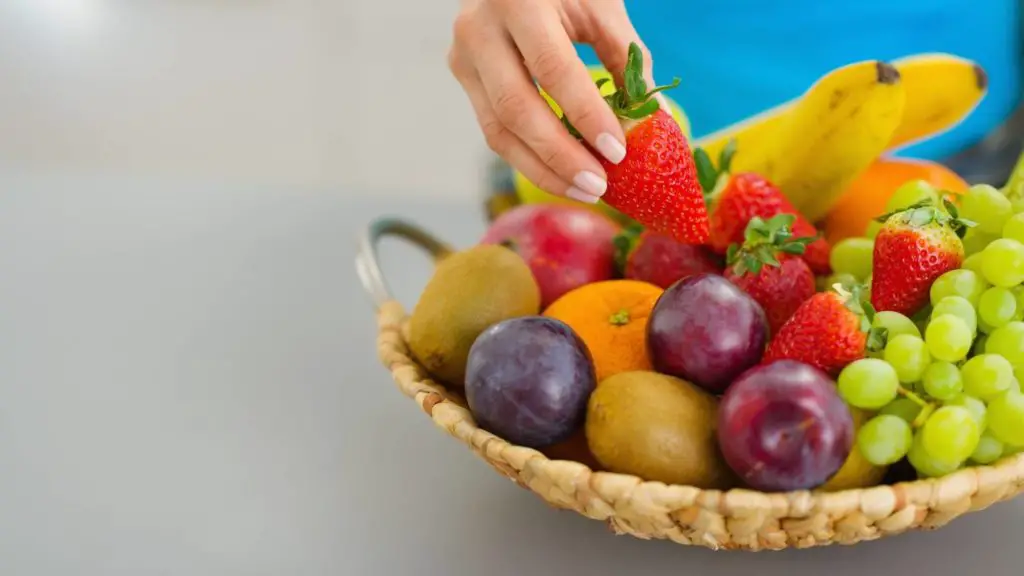
Introducing new foods to your pooch
As tempting as it is to throw your dog your leftovers, it’s very important to know what foods can dogs eat and what foods are toxic to dogs first. Before introducing new foods to your dog’s diet, consult your veterinarian. If you think your dog may have eaten something they shouldn’t, seek professional advice straight away.
Reference list
- Hearing Dogs “Safe foods for dogs”, https://www.hearingdogs.org.uk/training-our-puppies/dog-treat-recipes/dog-safe-food/, Accessed May 23rd, 2021.
- Puppyup “Healthy human foods for dogs”, https://www.puppyup.org/10-healthiest-human-foods-you-should-be-feeding-your-dog/, Accessed May 23rd, 2021.
- Falls Village Veterinary Hospital “Healthy, natural treats for dogs”, https://raleighncvet.com/nutrition-weight-management/11-healthy-natural-treats-for-dogs-in-your-kitchen/, Accessed May 23rd, 2021.
- Animal Trust “What can dogs eat”, https://www.animaltrust.org.uk/blog/what-can-dogs-eat/, Accessed May 23rd, 2021.

